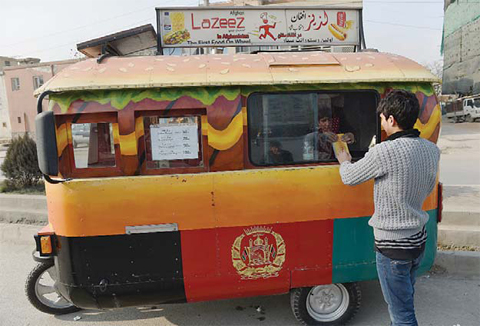 When the first Lazeez food truck arrived in Kabul many mistook it for a rickshaw and wanted to hail a ride-the yellow chassis and three wheels so reminiscent of taxis popular in South Asia. But it took little time for the city's emerging middle class to embrace the novelty of canteens-on-wheels serving Western fast foods around town. Parked on one of the capital's busiest roads, Obaidullah's truck-emblazoned with a giant hot dog, and the Lazeez logo-is unmissable. He serves a handful of customers, who are seemingly undeterred by the roadside pollution, and bullish about the sourcing and sanitation of the meat.
When the first Lazeez food truck arrived in Kabul many mistook it for a rickshaw and wanted to hail a ride-the yellow chassis and three wheels so reminiscent of taxis popular in South Asia. But it took little time for the city's emerging middle class to embrace the novelty of canteens-on-wheels serving Western fast foods around town. Parked on one of the capital's busiest roads, Obaidullah's truck-emblazoned with a giant hot dog, and the Lazeez logo-is unmissable. He serves a handful of customers, who are seemingly undeterred by the roadside pollution, and bullish about the sourcing and sanitation of the meat.
"Us Afghans are immune to all sorts of illnesses," jokes Mohammed-an oral hygiene student buying a quick burger. Food hygiene is terrible in Afghanistan, with 60 children out of 1,000 dying from diarrhea before the age of five, according to the French NGO Acted. So for Naveed Noori, who founded Lazeez with his cousin Abdullah Karim, finding meat without breaking the cold chain-the series of transportation and storage options that maintain a given temperature-is a challenge.
Naveed buys his hot dogs frozen from Karachi, the Pakistani port megacity located 1,400 kilometers from Kabul. "We have to pay attention to the conditions of the journey to be sure everything is going well, otherwise our cargo rots," says the 26-year old entrepreneur. For now, Naveed has found a successful route: Mohammed says his burger tastes just fine, as does the hot dog he also purchased, even if the fare is a long way from the tempting morsels available from food trucks in Paris or New York.
$150 a day
It has been a year and a half since the six food trucks emblazoned with the Lazeez logo-meaning "delicious" in Dari, one of Afghanistan's two national languages-began crisscrossing the streets of Kabul. Today Naveed has 15 employees and business is going well-for example, Obaidullah says the truck he manages serves between 30 and 60 customers a day. After expenses and paying his employees, Naveed pockets $150 a day, a fortune in Afghanistan where 72 percent of households earn less than $150 a month and social inequalities are enormous.
His success is even more impressive given that spiced dishes of lamb, mutton and rice still enjoy pride of place in Afghan cuisine, rather than the American fast food which has become so entrenched elsewhere. "Unfortunately no food truck offers Afghan dishes," laments Nassir, a student who is getting ready to chow down on a chicken sandwich from Manoto, a food truck also doing the rounds in Kabul like Lazeez.
"Sure I'd prefer rice and Afghan dishes but they don't have them," says Saifuddin, a cleaner. "I work for the council so I get a special price-I pay 50 afghanis (less than a dollar) for my hotdog instead of 100," he explains. "Even so, that's expensive because I earn 6,000 afghanis ($87) a month and I've got 12 mouths to feed," he says wearily.
Burgers and bribes
The popularity of food trucks in Kabul owes less to their culinary offerings than the slow lifestyle changes of an emerging middle class. The country's middle classes speak English and work in foreign NGOs, government ministries or Western companies based in Afghanistan. They stand apart from the vast majority of the population, in which just 32 percent of adults can read and write, according to a 2011 UNESCO figure. Congregating in Kabul, this worldier group has a need for speed. Take Idriss Atef, a telecommunications engineer who is paying a flying visit to a Lazeez food truck.
"It's the first time I've eaten from a food truck," he admits. But, echoing workers in London or New York, he adds: "I'm busy, I don't have time to go to a restaurant, sit down and order something." Naveed's success is all the rarer in Afghanistan, far from being a haven for entrepreneurs despite all the promises from President Ashraf Ghani, himself a former economist with the World Bank.
Red tape, renewed violence, and endemic corruption have not helped to create a business-friendly environment in the country. In 2014 Transparency International ranked the country 172 out of 175 in its Corruption Perceptions Index. Naveed knows something about corruption and can always count on the police to stop him from selling his hot dogs. "They don't know that it's only a food truck, nor do they know where we're allowed park," he explains. So, for a quieter life, he resorts to bakshish-a bribe "in the form of money or burgers".-AFP









